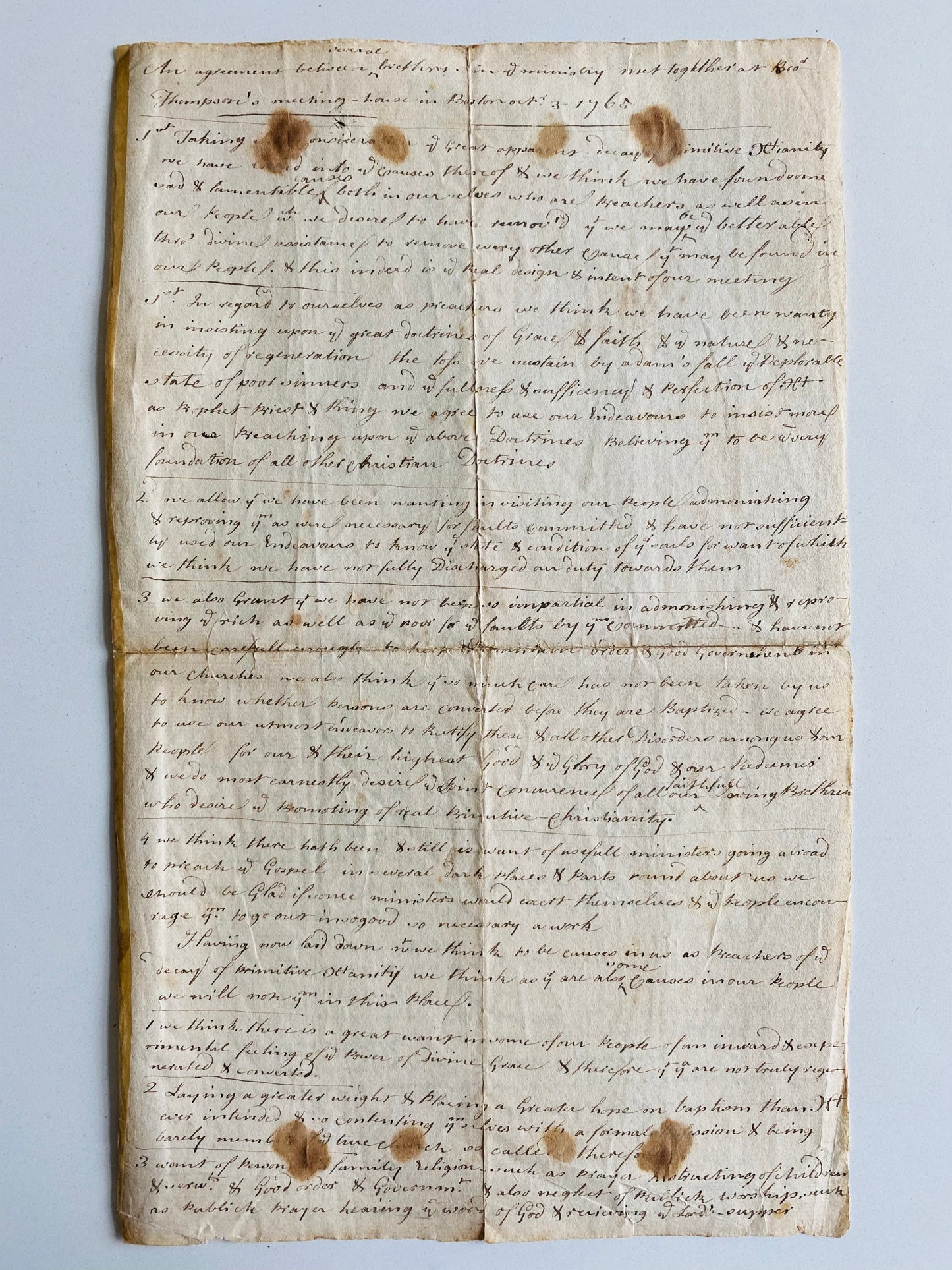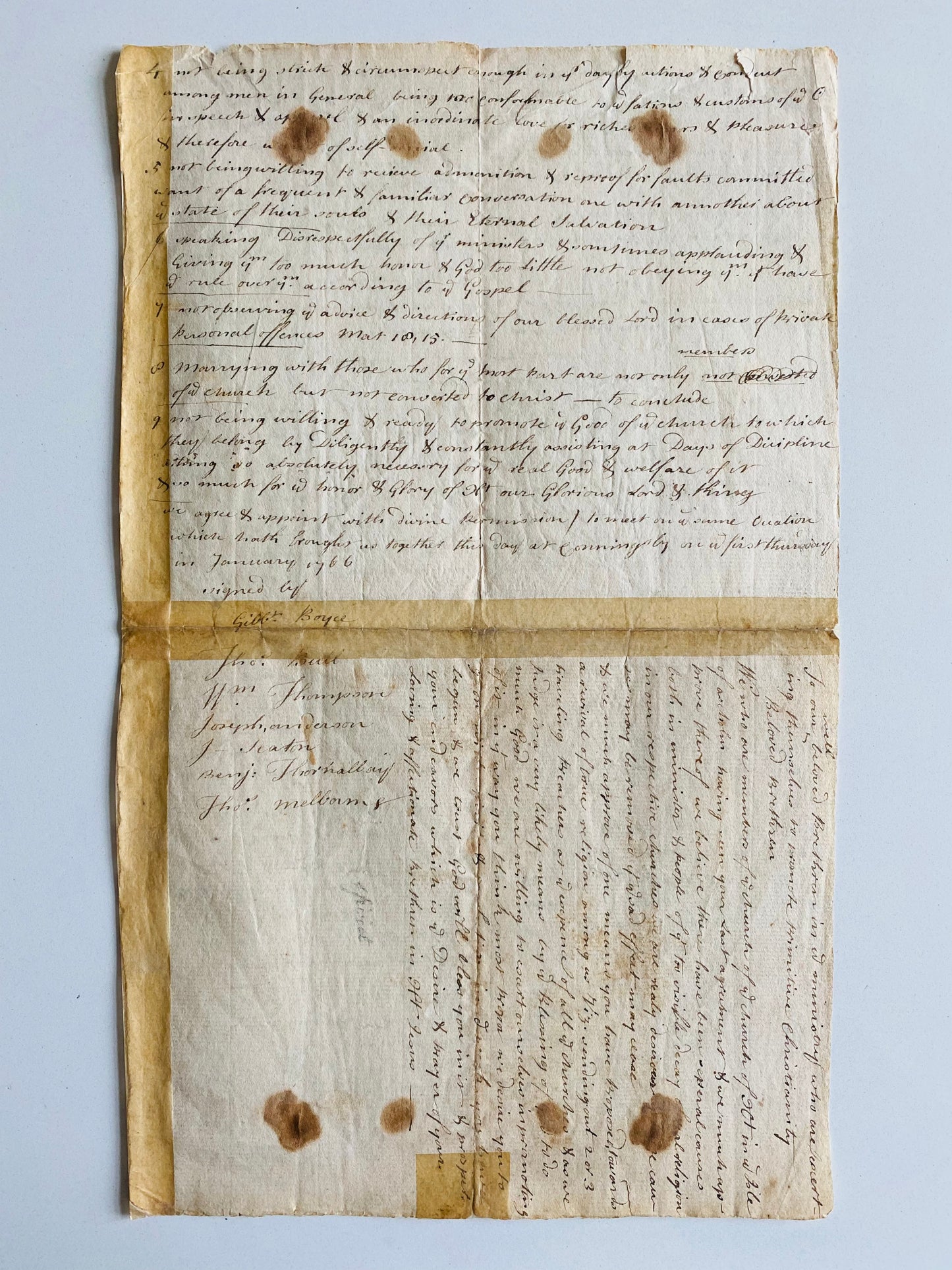Specs Fine Books
1765 BAPTIST REVIVAL COVENANT. Rare Unpublished Manuscript Document among 18th Century Baptists Calling for Revival
1765 BAPTIST REVIVAL COVENANT. Rare Unpublished Manuscript Document among 18th Century Baptists Calling for Revival
Couldn't load pickup availability
An exceptionally rare piece of 18th century Baptist history, the present document is the original authorial manuscript. All signer signatures are recorded in the hand of the composer since it was designed to be printed for distribution. Authored by the group together, the likely penmen would seem to be Gilbert Boyce. The final printed document is not extant, making this the lone surviving record of the occasion.
The document records a meeting of distinguished Baptists from the Lincolnshire region gathered specifically for the revival of vital religion, or, as they most regularly call it in the document, primitive Christianity. They then append a letter committing themselves to locate 2 to 3 traveling evangelists [more properly, revivalists] to stir up vital religion among the Baptists of England.
As many of the signers were participants in the Great Awakening of the 1740's, the document has the feeling of longing for and returning to the deeply experimental Christianity of that era.
The full text is as follows:
"An agreement between several brothers in ye ministry met together at Bro. Thompson's meeting house in Boston, Octr 3, 1765
1st Taking into consideration ye great apparent decay of primitive xtianity we have looked into ye causes thereof & we think we have found some sad & lamentable causes both in ourselves who are preachers as well as in our people which we desire to have remov'd, that we may be ye better able thro divine assistance to remove every other cause that may be found in our people. & this indeed is ye real design & intent of our meeting.
1. In regard to ourselves as preachers we think we have been wanting in insisting upon ye great doctrines of Grace & faith & ye nature & necessity of regeneration, the loss we sustain by Adam's fall , ye deplorable state of poor sinners, and ye fullness & sufficiency & perfection of Xt as Prophet, Priest, & King. We agree to use our endeavours to insist more in our preaching upon ye above Doctrines, believing them to be ye very foundation of all other Christian doctrines.
2. We allow that we have been wanting in visiting our people, admonishing & reproving them as were necessary for faults committed & have not sufficiently used our endeavours to now ye state & condition of ye souls for want of which we think we have not fully discharged our duty towards them.
3. We also grant that we have not been as impartial in admonishing & reproving ye rich as well as ye poor for their faults by them committed. & have not been careful enough to keep & maintain order & good government in our churches. We also think that so much care has not been taken by us to know whether persons are converted before they are Baptized - we agree to use our utmost endeavours to rectify these & all other Disorders among us & our people for our & their highest good & ye Glory of God & our Redeemers' & we do so earnestly desire ye first concurrence of all our faithful & loving Brethren who desire ye promoting of real Primitive Christianity.
4. We think there hath been & still is want of usefully ministers going abroad to preach ye Gospel in several dark places & parts round about us. We should be glad if some ministers would exert themselves & ye people encourage them to go out in so good and so necessary a work.
Having now laid down what we think to be causes in us as preachers of ye decay of primitive Xtianity, we think as that there are also some causes in our people, we will note them in this place.
1. We think there is a great want in some of our people of an inward & experimental feeling of ye power of divine grace & therefore that they are not truly regenerated & converted.
2. Laying a greater weight & placing a greater hope on baptism than it was intended & so contenting themselves with a formal professing & being barely members of ye true Church, so called, therefore . . .
3. Want of personal & family religion such as prayer, instructing of children, & servants & good order & government & also neglect of Publick Worship, such as Publick prayer, hearing ye Word of God & receiving ye Lord's Supper.
4. Not being strict & circumspect enough in ye daily actions & conduct among men in general, being comfortable to ye fashions & customs of ye world & therefore want of self-denial.
5. Not being willing to receive admonition & reproof for faults committed, want of a frequent & familiar conversation one with another about ye state of their souls & their eternal salvation.
6. Speaking disrespectfully of ye ministers & sometimes applauding & giving them too much honor & God too little, not obeying them that have ye rule over them according to ye Gospel.
7. Not observing ye advice & direction of our blessed Lord in cases of private personal offenses. Matt 18, 15.
8. Marrying with those who for ye most part are not only not members of ye church, but not converted to Christ - to conclude
9. Not being willing & ready to promote ye Good of ye church to which they belong by Diligently & constantly assisting at Days of Discipline, something so absolutely necessary for ye real Good & welfare of . . . & so much for ye honor & glory of Xt our Glorious Lord & King, we agree & appoint with divine permission to meet on ye same occasion which hath brought us together this day at Conningsby on ye first Thursday in January, 1766..
Signed by
Gilbert Boyce
John Bull
William Thompson
Joseph Anderson
J Seaton
Benjamin Thornalby
Thomas Melborn"
This is then followed by a proposed circular letter from the group proposing that the Baptists together employ 2 or 3 traveling revivalists to visit all the Baptist churches. In the same hand.
"To our well beloved Brethren in ye ministry who are exerting themselves to practice primitive Christianity.
Beloved Brethren,
We who are members of ye church of ye church of Xt in ye Isle of Ascholm [Axholme; which is not an Island, but refers to this region of Lincolnshire] having seen your Last agreement & we much approve thereof we believe there have been several causes both in ministry & people of ye too visible decay of vital religion in our respective churches. We are really desirous that these causes may be removed that ye sad effect may case & we much approve of one means you have proposed, towards a revival of true religion among us, viz. sending out 2 or 3 traveling preachers at ye expense of all ye churches & as we judge this a very likely means by ye blessing of God to do much good, we are willing to exert ourselves in promoting of it in ye way you think most proper we desire you to go on with spirit & ***** in ye work you have begun & we trust God will bless you in it & proper your endeavours which is ye Desire & prayer of your loving & affectionate Brethren in Xt Jesus."
It is clear this document was meant to be printed and distributed among the Baptists of England, though no extant example can be located. It seems consistent with this group of pastors, many of whom had experienced the Great Awakening of the 1740's, and their longing to recover the revivalist experiences of that era.
The signers include:
Gilbert Boyce (1712-1800) of Coningsby, friend and public theological opponent to John Wesley on the subject of Baptism. He is the subject of an entire chapter in Pulpit and People: Studies in Eighteenth Century Baptist Life and Thought, edited by John H. Y. Briggs. Boyce also ordained Dan Taylor
William Thompson (1735-1794) of Boston, friend and co-laborer with Baptist pioneer, Dan Taylor. Taylor also wrote Thompson's memoir and became active in the Lincolnshire General Baptist Assembly in 1763.
Joseph Anderson (ord. 1762-d.1781) of Gosberton, who experienced a period of extensive revival under his ministry, perhaps directly as a result of this meeting.
Etc.,
Good + with reinforced edges and hinges; some small tears and spots not irreparably impeding legibility. A very handsome document.
Share




